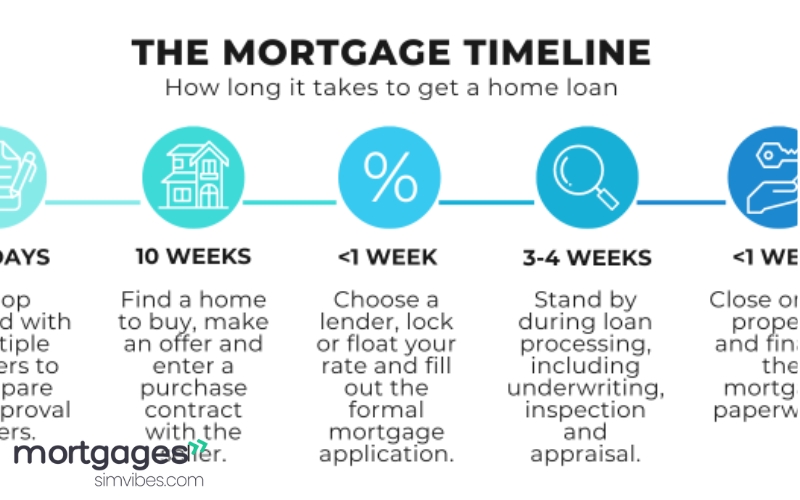When deciding to borrow money to buy a home or property, choosing a permanent mortgage is one of the most important decisions you will make. Permanent mortgages can last anywhere from 15 to 30 years, and making the wrong decision can impact your personal finances for a long time. Therefore, before making a choice, you need to carefully consider the factors that can affect your financial stability. This article will outline some important considerations that you need to consider when choosing a permanent mortgage.
1. INTEREST RATES AND STABILITY
One of the most important factors when choosing a permanent mortgage is the interest rate. The interest rate will directly affect the amount you have to pay each month and the total amount you will pay over the life of the loan. There are two main types of interest rates: fixed interest rates and variable interest rates.

FIXED RATE
A fixed-rate mortgage has an interest rate that remains the same throughout the life of the loan, making it easier to calculate your monthly payments. This is a popular choice for people who want stability and don’t want to worry about interest rates rising in the future. However, fixed rates may be higher than the initial interest rates of variable-rate loans, but you’ll have peace of mind throughout the life of the loan.
VARIABLE RATE
A variable-rate mortgage (also known as a variable-rate mortgage) has an interest rate that changes over time, usually based on market interest rates. The initial interest rate on this type of mortgage is usually lower than a fixed rate, but it can change throughout the life of the loan. If you choose this type of mortgage, you’ll need to consider your tolerance for risk if interest rates rise in the future.
2. LOAN TERM AND MONTHLY PAYMENT
When choosing a long-term mortgage, the loan term is a very important factor. A long-term loan will help you reduce your monthly payment, but the total amount you pay over the life of the loan may be higher than a short-term loan.
15-YEAR LOAN TERM
With a 15-year mortgage, you will have a higher monthly payment, but you will pay it off faster and reduce the amount of interest you pay over the life of the loan. This loan is suitable for people who are financially stable and want to pay off their debt quickly.
30-YEAR LOAN TERM
With a 30-year mortgage, your monthly payment will be lower, but the total amount you pay over the life of the loan will be higher because you will be paying interest for a longer period. This loan is suitable for people who have a stable income and want financial flexibility in repaying the loan.
3. ADDITIONAL COSTS AND FEES
When choosing a long-term mortgage, you also need to consider additional costs and fees in addition to the interest rate. These costs may include:
Loan origination fee: This is a fee that the bank or financial institution requires to process the loan procedures.
Property insurance (PMI) fee: If you cannot put down at least 20% of the value of the home as a down payment, the bank may require you to purchase credit insurance to protect the loan.
Prepayment fee: Some banks may impose a fee if you pay off the loan before the term of the loan. This can reduce your financial flexibility if you plan to pay off the loan early.
Understanding the costs involved will help you accurately calculate the total cost of the loan and decide whether you can afford to pay them.
4. LOAN CONDITIONS
Every permanent mortgage has different terms that you need to understand before signing. These terms may include:
Repayment terms: Banks may require you to repay the loan in a specific way, such as making monthly payments on a certain date or paying off a certain amount of time in advance.
Interest rate changes: If you choose a variable rate mortgage, make sure you understand how the interest rate will change and how much it will change over the life of the loan.
Refinance terms: Some banks allow you to refinance your loan after a certain period of time if market conditions change, but may require you to pay a fee.
5. YOUR ABILITY TO PAY AND YOUR FINANCIAL SITUATION
Before choosing a long-term mortgage, you need to carefully consider your financial capacity. Monthly repayments must be consistent with your income and personal budget to avoid financial overload.
Carefully calculate your monthly income and expenses to ensure that you can repay the loan without facing financial difficulties. In addition, you also need to have a backup plan in case of unexpected changes in income or expenses.
6. CHOOSE A BANK AND FINANCIAL INSTITUTION
Not all banks or financial institutions offer mortgage loans with the same terms and interest rates. Therefore, you need to compare mortgage packages from different banks to choose the loan package that best suits your needs and financial capabilities.
Carefully research banks with high reputation, good customer service, and flexible loan packages. You can also seek advice from financial experts or real estate brokers to help you choose a long-term mortgage wisely.
7. CONSIDER YOUR FINANCIAL FUTURE
Finally, when choosing a long-term mortgage, you need to think about your financial future. Will you continue to have a stable job or may you have difficulty maintaining your income? Are you planning to buy additional property, change jobs, or move to another location in the next few years? These factors will affect your ability to repay the loan and determine the type of mortgage you choose.
